Burt A. The Evolution of the British Empire and Commonwealth From the American Revolution
Подождите немного. Документ загружается.

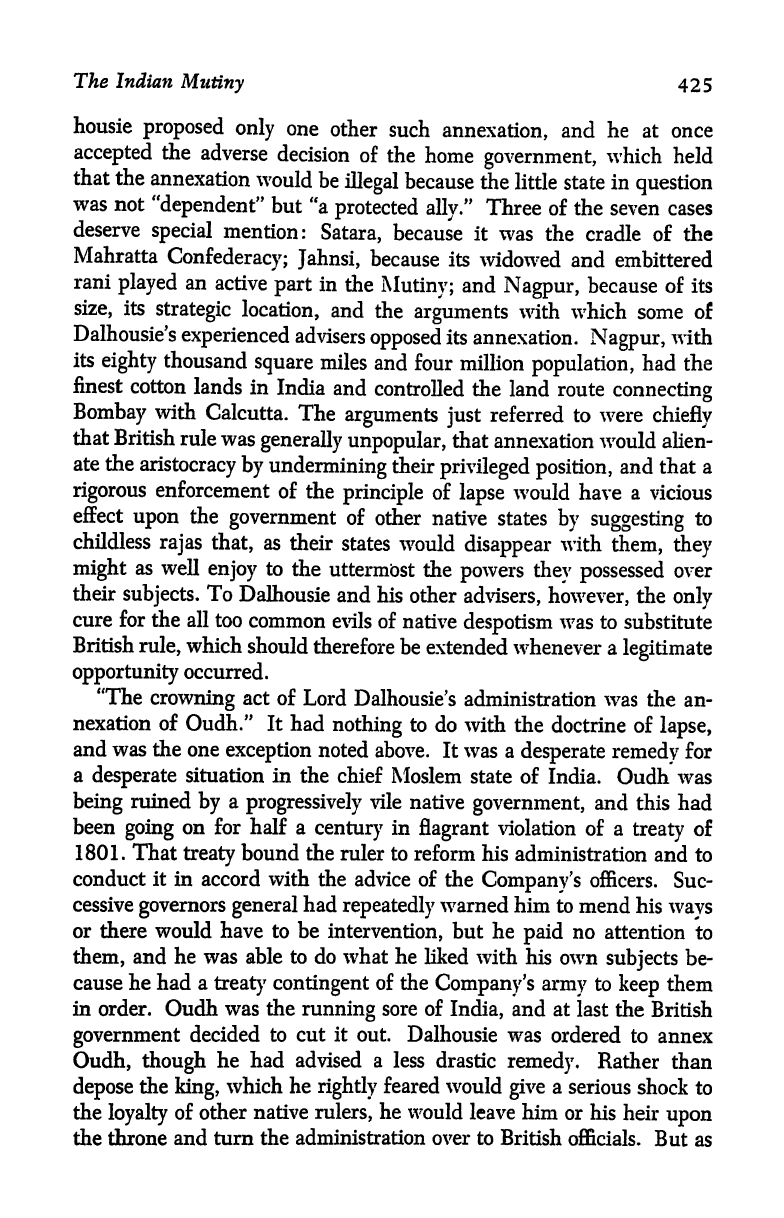
The Indian
Mutiny
425
housie
proposed
only
one
other
such
annexation,
and
he
at once
accepted
the
adverse
decision
of the
home
government,
which held
that
the
annexation
would
be
illegal
because
the
little state
in
question
was
not
"dependent"
but
"a
protected
ally."
Three of the seven cases
deserve
special
mention:
Satara,
because
it was
the cradle
of
the
Mahratta
Confederacy;
Jahnsi,
because its
widowed
and embittered
rani
played
an
active
part
in
the
Mutiny;
and
Nagpur,
because of its
size,
its
strategic
location,
and
the
arguments
with
which some of
Dalhousie's
experienced
advisers
opposed
its annexation.
Nagpur,
with
its
eighty
thousand
square
miles
and four
million
population,
had the
finest
cotton
lands in
India
and
controlled the land route
connecting
Bombay
with
Calcutta.
The
arguments
just
referred to
were
chiefly
that
British
rule
was
generally
unpopular,
that
annexation would
alien-
ate the
aristocracy
by
undermining
their
privileged position,
and
that a
rigorous
enforcement
of
the
principle
of
lapse
would have
a
vicious
effect
upon
the
government
of other
native states
by
suggesting
to
childless
rajas
that,
as
their
states
would
disappear
with
them,
they
might
as
well
enjoy
to
the
uttermbst the
powers
they possessed
over
their
subjects.
To
Dalhousie
and
his other
advisers,
however,
the
only
cure for the
all
too
common
evils
of
native
despotism
was
to
substitute
British
rule,
which
should
therefore
be
extended whenever a
legitimate
opportunity
occurred.
"The
crowning
act
of
Lord
Dalhousie's
administration
was the
an-
nexation
of
Oudh." It
had
nothing
to
do with
the
doctrine of
lapse,
and
was the
one
exception
noted above.
It was a
desperate remedy
for
a
desperate
situation in the
chief
Moslem state
of
India.
Oudh
was
being
ruined
by
a
progressively
vile
native
government,
and
this
had
been
going
on for half a
century
in
flagrant
violation of a
treaty
of
1801.
That
treaty
bound the ruler
to
reform
his
administration
and to
conduct
it
in accord with
the advice
of
the
Company's
officers.
Suc-
cessive
governors general
had
repeatedly
warned him
to
mend
his
ways
or there
would
have
to
be
intervention,
but he
paid
no
attention
to
them,
and
he
was
able to
do
what
he
liked
w
r
ith
his own
subjects
be-
cause he had a
treaty
contingent
of
the
Company's army
to
keep
them
in
order. Oudh
was
the
running
sore of
India,
and
at
last
the
British
government
decided
to
cut
it
out.
Dalhousie
was
ordered
to annex
Oudh,
though
he had advised
a
less
drastic
remedy.
Rather
than
depose
the
king,
which
he
rightly
feared
would
give
a
serious
shock
to
the
loyalty
of other
native
rulers,
he
would leave
him
or
his
heir
upon
the
throne and
turn the
administration over
to
British
officials.
But
as
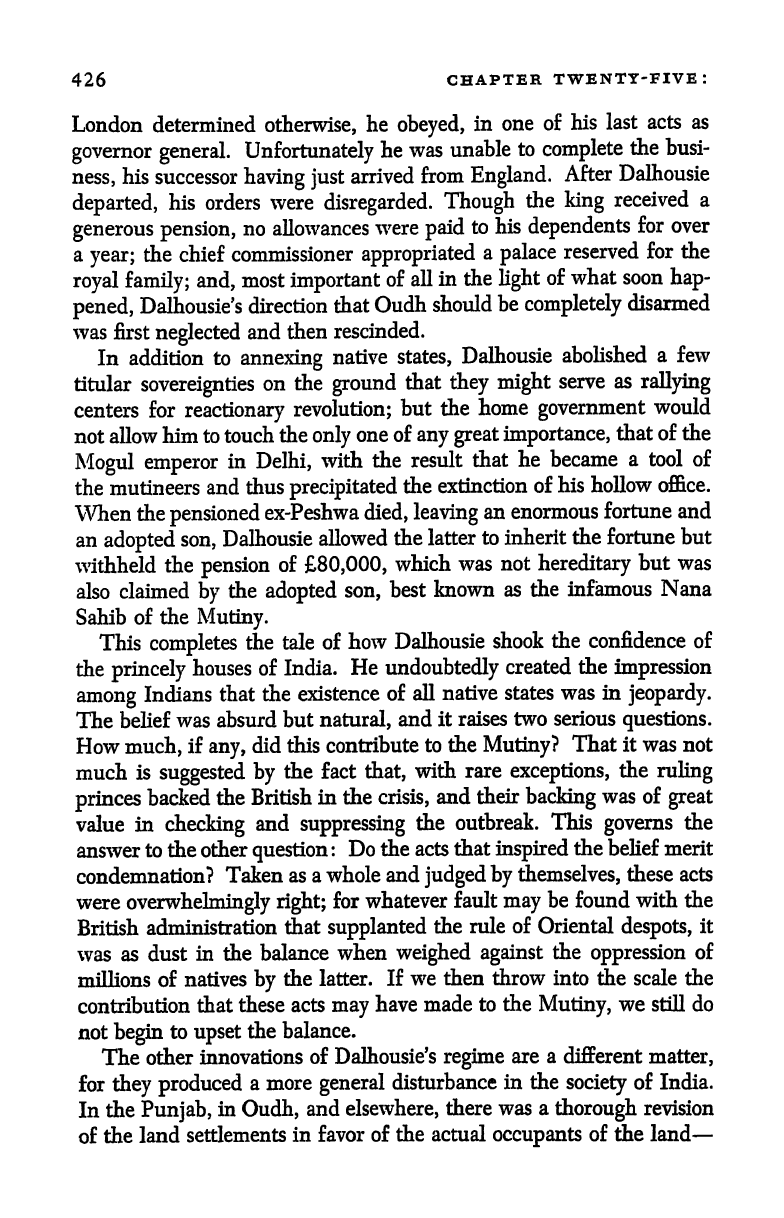
426
CHAPTER
TWENTY-FIVE:
London
determined
otherwise,
he
obeyed,
in
one
of
his
last
acts
as
governor
general.
Unfortunately
he
was
unable
to
complete
the busi-
ness,
his
successor
having
just
arrived
from
England.
After
Dalhousie
departed,
his
orders
were
disregarded.
Though
the
king
received
a
generous
pension,
no
allowances
were
paid
to
his
dependents
for over
a
year;
the chief
commissioner
appropriated
a
palace
reserved
for
the
royal
family;
and,
most
important
of
all
in the
light
of
what soon
hap-
pened,
Dalhousie's
direction
that
Oudh
should
be
completely
disarmed
was
first
neglected
and
then
rescinded.
In
addition
to
annexing
native
states,
Dalhousie
abolished
a few
titular
sovereignties
on
the
ground
that
they might
serve
as
rallying
centers for
reactionary
revolution;
but
the
home
government
would
not allow
him
to
touch
the
only
one of
any
great
importance,
that of the
Mogul
emperor
in
Delhi,
with the
result
that
he became
a
tool of
the
mutineers
and
thus
precipitated
the
extinction
of
his
hollow
office.
When
the
pensioned
ex-Peshwa
died,
leaving
an
enormous
fortune
and
an
adopted
son,
Dalhousie
allowed
the latter
to inherit
the
fortune
but
withheld
the
pension
of
80,000,
which
was
not
hereditary
but was
also
claimed
by
the
adopted
son,
best
known
as
the
infamous Nana
Sahib
of
the
Mutiny.
This
completes
the tale
of
how
Dalhousie
shook
the
confidence of
the
princely
houses of
India.
He
undoubtedly
created
the
impression
among
Indians
that
the existence
of
all
native
states was
in
jeopardy.
The belief
was
absurd but
natural,
and
it
raises two serious
questions.
How
much,
if
any,
did this contribute
to
the
Mutiny?
That it was not
much
is
suggested
by
the fact
that,
with
rare
exceptions,
the
ruling
princes
backed
the
British
in the
crisis,
and their
backing
was of
great
value
in
checking
and
suppressing
the
outbreak.
This
governs
the
answer
to
the
other
question
:
Do
the acts
that
inspired
the
belief
merit
condemnation?
Taken
as
a whole
and
judged
by
themselves,
these acts
were
overwhelmingly
right;
for
whatever
fault
may
be found
with
the
British
administration
that
supplanted
the rule
of
Oriental
despots,
it
was
as dust
in the
balance
when
weighed
against
the
oppression
of
millions
of
natives
by
the latter.
If
we
then throw into the scale the
contribution
that
these
acts
may
have
made to the
Mutiny,
we still do
not
begin
to
upset
the balance.
The
other
innovations
of Dalhousie's
regime
are
a
different
matter,
for
they
produced
a more
general
disturbance
in the
society
of India.
In
the
Punjab,
in
Oudh,
and
elsewhere,
there was
a
thorough
revision
of
the
land
settlements
in
favor of
the
actual
occupants
of the land
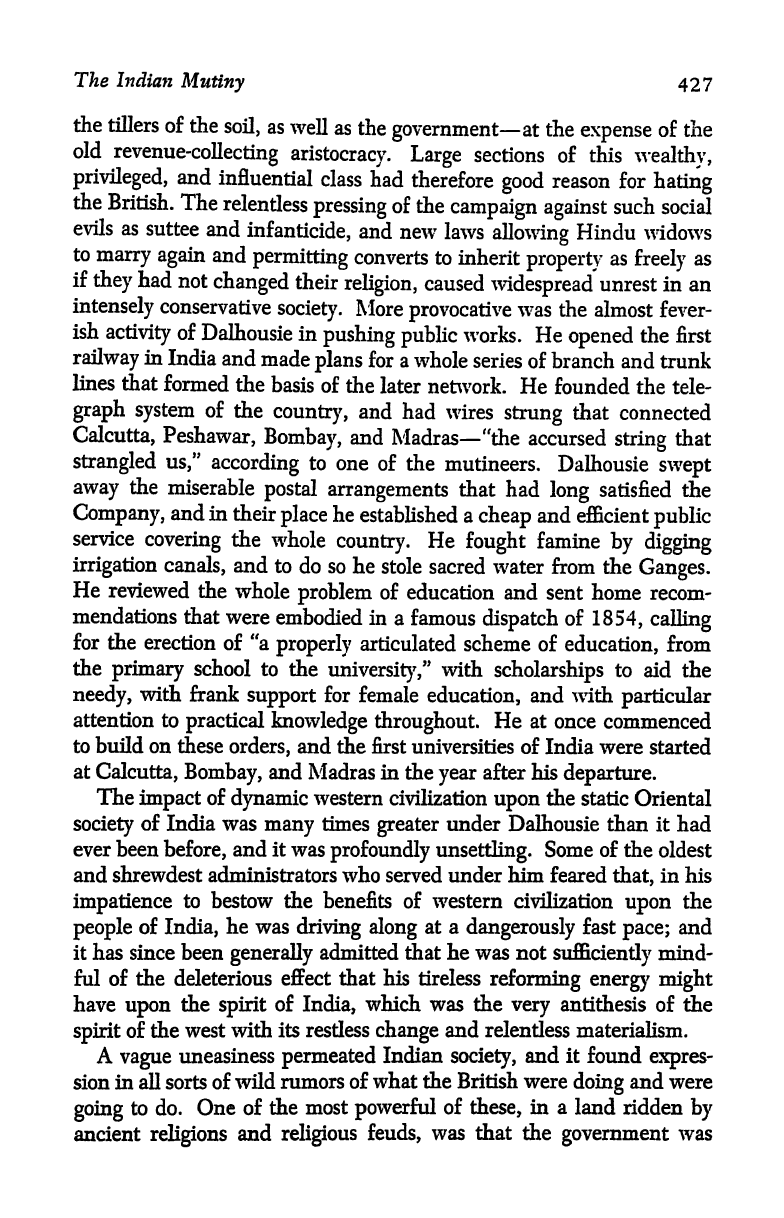
The
Indian
Mutiny
427
the
tillers
of
the
soil,
as
well
as
the
government
at
the
expense
of the
old
revenue-collecting
aristocracy.
Large
sections
of this
wealthy,
privileged,
and
influential
class
had
therefore
good
reason
for
hating
the
British.
The
relentless
pressing
of the
campaign
against
such
social
evils as
suttee
and
infanticide,
and new
laws
allowing
Hindu widows
to
marry
again
and
permitting
converts
to
inherit
property
as
freely
as
if
they
had
not
changed
their
religion,
caused
widespread
unrest in an
intensely
conservative
society.
More
provocative
was the
almost fever-
ish
activity
of
Dalhousie
in
pushing
public
works.
He
opened
the
first
railway
in
India
and
made
plans
for a
whole series
of branch
and
trunk
lines that
formed
the
basis of
the
later
network.
He
founded the tele-
graph
system
of
the
country,
and
had wires
strung
that
connected
Calcutta,
Peshawar,
Bombay,
and
Madras
"the accursed
string
that
strangled
us,"
according
to one
of
the
mutineers,
Dalhousie
swept
away
the
miserable
postal
arrangements
that
had
long
satisfied
the
Company,
and in
their
place
he
established a
cheap
and
efficient
public
service
covering
the
whole
country.
He
fought
famine
by
digging
irrigation
canals,
and
to
do so he
stole
sacred
water
from the
Ganges.
He
reviewed
the
whole
problem
of
education
and sent home
recom-
mendations
that
were
embodied in
a
famous
dispatch
of
1854,
calling
for the
erection
of
"a
properly
articulated scheme of
education,
from
the
primary
school to the
university,"
with
scholarships
to
aid
the
needy,
with
frank
support
for
female
education,
and
with
particular
attention
to
practical
knowledge
throughout.
He at
once
commenced
to build on
these
orders,
and the
first
universities
of
India were
started
at
Calcutta,
Bombay,
and
Madras
in
the
year
after his
departure.
The
impact
of
dynamic
western
civilization
upon
the
static
Oriental
society
of
India was
many
times
greater
under
Dalhousie
than it
had
ever been
before,
and it
was
profoundly
unsettling.
Some of
the
oldest
and
shrewdest
administrators who served
under him
feared
that,
in
his
impatience
to bestow the benefits
of
western
civilization
upon
the
people
of
India,
he
was
driving along
at a
dangerously
fast
pace;
and
it has since been
generally
admitted that he was
not
sufficiently
mind-
ful of
the
deleterious
effect that
his tireless
reforming energy
might
have
upon
the
spirit
of
India,
which was the
very
antithesis
of the
spirit
of the
west
with its restless
change
and
relentless materialism.
A
vague
uneasiness
permeated
Indian
society,
and
it
found
expres-
sion
in
all
sorts of
wild rumors
of what the British were
doing
and were
going
to do. One
of
the
most
powerful
of
these,
in
a
land
ridden
by
ancient
religions
and
religious
feuds,
was
that
the
government
was
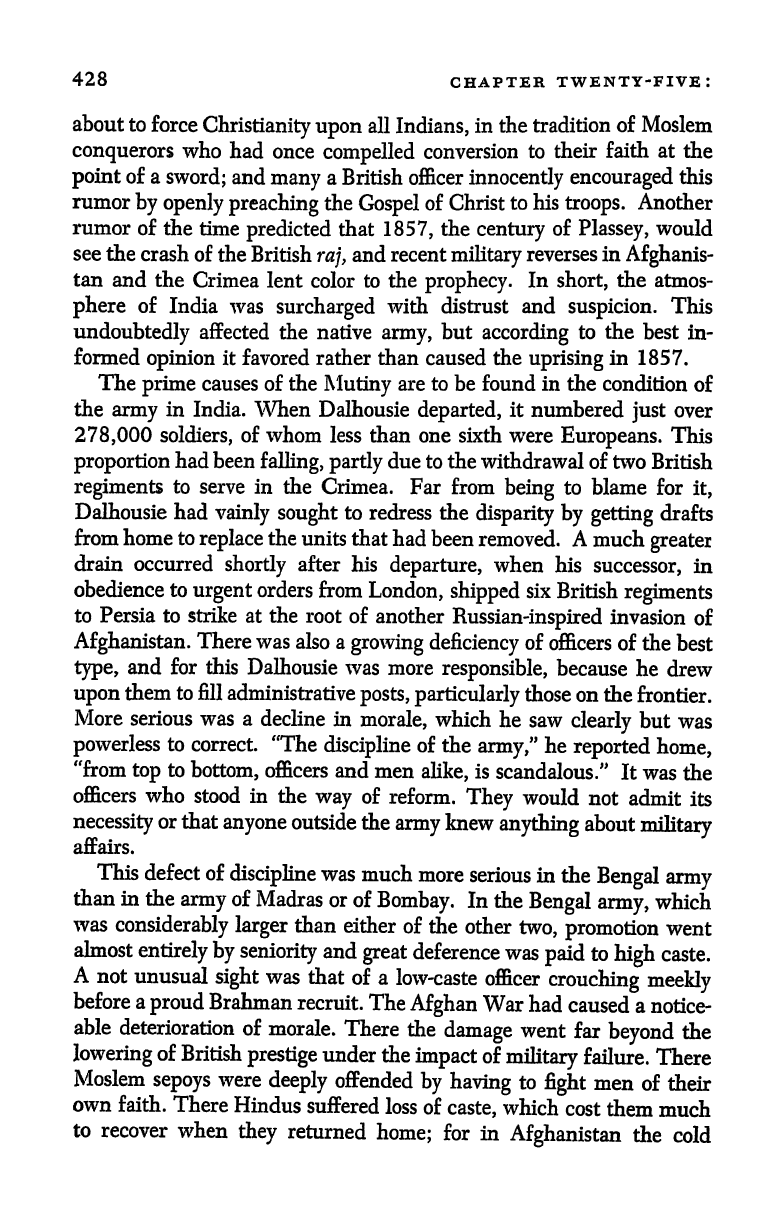
428
CHAPTER
TWENTY-FIVE:
about
to
force
Christianity
upon
all
Indians,
in the
tradition
of
Moslem
conquerors
who
had once
compelled
conversion
to
their
faith at
the
point
of a
sword;
and
many
a British officer
innocently encouraged
this
rumor
by
openly
preaching
the
Gospel
of Christ
to his
troops.
Another
rumor
of
the
time
predicted
that
1857,
the
century
of
Plassey,
would
see
the
crash
of
the
British
raj,
and
recent
military
reverses in
Afghanis-
tan
and the
Crimea
lent
color
to the
prophecy.
In
short,
the
atmos-
phere
of
India
was
surcharged
with
distrust and
suspicion.
This
undoubtedly
affected the native
army,
but
according
to
the
best
in-
formed
opinion
it favored rather than caused the
uprising
in
1857.
The
prime
causes of
the
Mutiny
are
to
be found in the
condition
of
the
army
in
India.
When
Dalhousie
departed,
it
numbered
just
over
278,000
soldiers,
of whom
less than one sixth
were
Europeans.
This
proportion
had been
falling, partly
due
to the
withdrawal of two
British
regiments
to serve in the
Crimea. Far
from
being
to blame
for
it,
Dalhousie had
vainly
sought
to redress
the
disparity
by
getting
drafts
from
home to
replace
the
units that
had been
removed. A much
greater
drain occurred
shortly
after his
departure,
when his
successor,
in
obedience to
urgent
orders from
London,
shipped
six
British
regiments
to
Persia
to strike
at the
root of
another
Russian-inspired
invasion
of
Afghanistan.
There was
also a
growing deficiency
of
officers
of
the
best
type,
and for this
Dalhousie
was more
responsible,
because he
drew
upon
them
to
fill
administrative
posts,
particularly
those
on
the
frontier.
More serious
was
a
decline in
morale,
which he
saw
clearly
but
was
powerless
to correct.
"The
discipline
of
the
army,"
he
reported
home,
"from
top
to
bottom,
officers
and men
alike,
is
scandalous."
It
was
the
officers who stood in
the
way
of
reform.
They
would
not
admit
its
necessity
or
that
anyone
outside
the
army
knew
anything
about
military
affairs.
This defect
of
discipline
was
much
more
serious in
the
Bengal
army
than in
the
army
of
Madras
or of
Bombay.
In
the
Bengal
army,
which
was
considerably
larger
than
either
of
the
other
two,
promotion
went
almost
entirely by
seniority
and
great
deference
was
paid
to
high
caste.
A
not
unusual
sight
was that
of a
low-caste
officer
crouching meekly
before a
proud
Brahman
recruit.
The
Afghan
War
had
caused a
notice-
able
deterioration
of
morale.
There
the
damage
went
far
beyond
the
lowering
of
British
prestige
under
the
impact
of
military
failure.
There
Moslem
sepoys
were
deeply
offended
by
having
to
fight
men
of
their
own faith.
There
Hindus
suffered
loss
of
caste,
which
cost
them
much
to
recover
when
they
returned
home;
for in
Afghanistan
the
cold
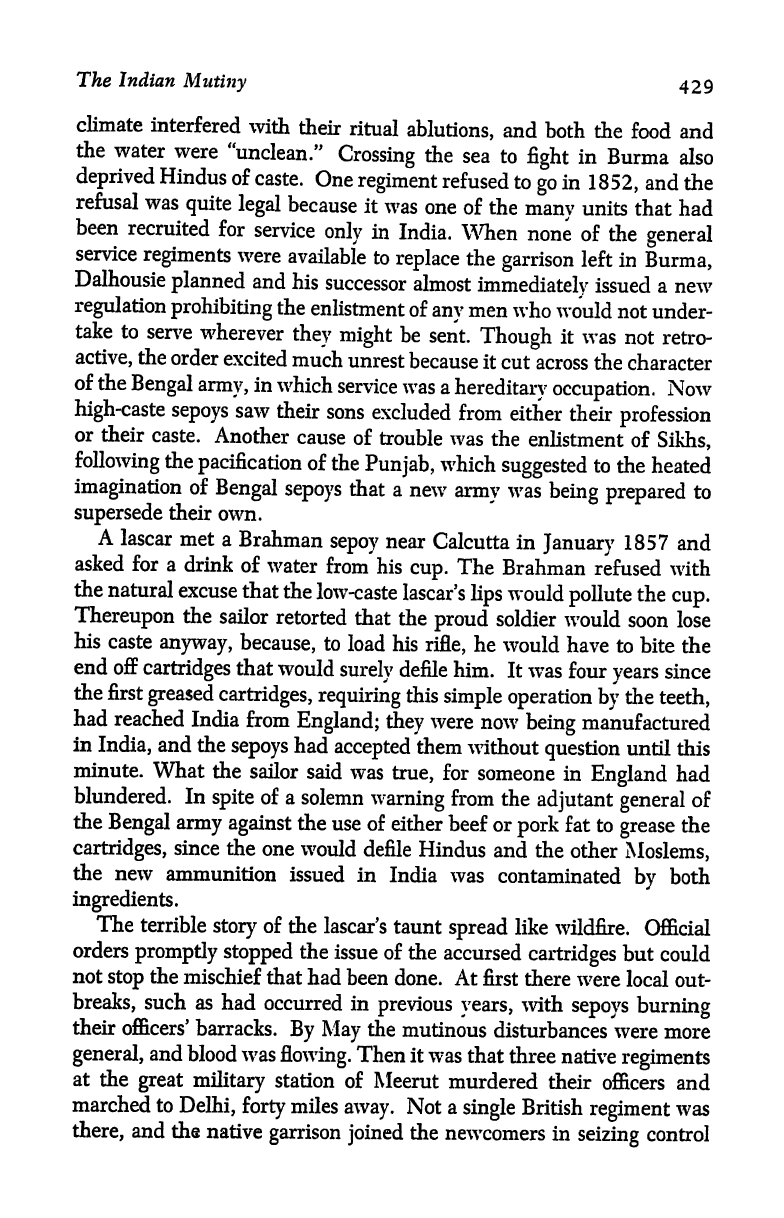
The
Indian
Mutiny
429
climate
interfered
with
their
ritual
ablutions,
and
both
the
food
and
the
water
were
"unclean."
Crossing
the
sea
to
fight
in
Burma
also
deprived
Hindus
of
caste.
One
regiment
refused
to
go
in
1852,
and
the
refusal
was
quite
legal
because
it
was
one
of
the
many
units
that had
been
recruited
for
service
only
in
India.
When
none
of
the
general
service
regiments
were
available
to
replace
the
garrison
left in
Burma,
Dalhousie
planned
and
his
successor
almost
immediately
issued
a
new
regulation
prohibiting
the
enlistment
of
any
men
who
would not
under-
take
to
serve
wherever
they
might
be
sent.
Though
it
was
not retro-
active,
the
order
excited
much
unrest
because
it cut
across the
character
of
the
Bengal
army,
in
which
service
was a
hereditary
occupation.
Now
high-caste
sepoys
saw
their
sons
excluded
from
either
their
profession
or their
caste.
Another
cause
of
trouble
was
the
enlistment of
Sikhs,
following
the
pacification
of
the
Punjab,
which
suggested
to
the
heated
imagination
of
Bengal
sepoys
that a
new
army
was
being prepared
to
supersede
their
own.
A
lascar
met
a
Brahman
sepoy
near
Calcutta in
January
1857
and
asked
for a
drink
of
water
from
his
cup.
The
Brahman
refused with
the
natural
excuse
that
the
low-caste
lascar's
lips
would
pollute
the
cup.
Thereupon
the
sailor
retorted that
the
proud
soldier
would
soon lose
his
caste
anyway,
because,
to
load his
rifle,
he
would
have
to bite
the
end off
cartridges
that
would
surely
defile
him.
It
was
four
years
since
the
first
greased
cartridges,
requiring
this
simple
operation
by
the
teeth,
had
reached
India
from
England;
they
were
now
being
manufactured
in
India,
and the
sepoys
had
accepted
them
without
question
until
this
minute.
What
the
sailor
said
was
true,
for
someone
in
England
had
blundered. In
spite
of a
solemn
warning
from
the
adjutant
general
of
the
Bengal
army
against
the
use
of
either
beef
or
pork
fat
to
grease
the
cartridges,
since
the
one
would defile
Hindus
and the
other
Moslems,
the
new
ammunition
issued in
India
was
contaminated
by
both
ingredients.
The
terrible
story
of
the
lascar's
taunt
spread
like
wildfire.
Official
orders
promptly
stopped
the
issue of
the
accursed
cartridges
but
could
not
stop
the
mischief that
had
been
done.
At
first there
were
local
out-
breaks,
such
as
had
occurred in
previous
years,
with
sepoys
burning
their
officers'
barracks.
By
May
the
mutinous
disturbances
were more
general,
and
blood was
flowing.
Then
it
was
that
three
native
regiments
at
the
great
military
station
of
Meerut
murdered
their
officers
and
marched to
Delhi,
forty
miles
away.
Not a
single
British
regiment
was
there,
and the
native
garrison
joined
the
newcomers
in
seizing
control
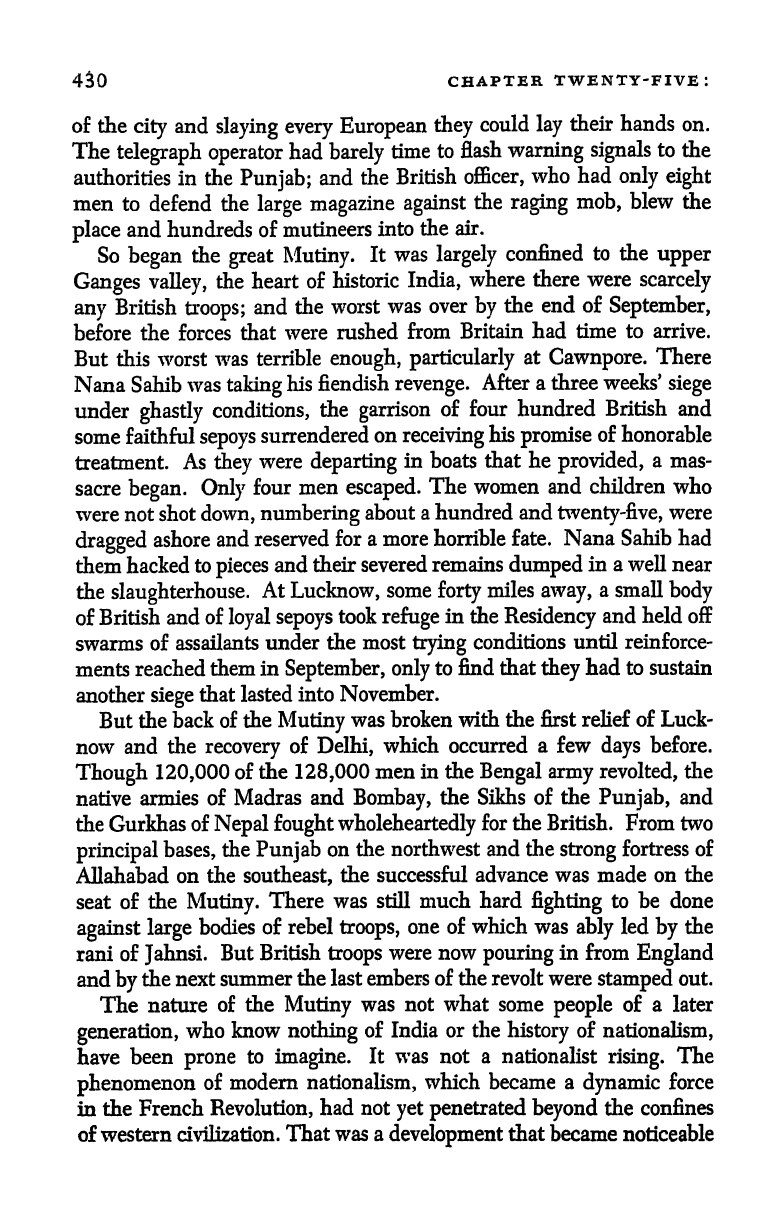
430
CHAPTER
TWENTY-FIVE:
of the
city
and
slaying
every
European
they
could
lay
their hands
on.
The
telegraph operator
had
barely
time
to flash
warning
signals
to the
authorities
in the
Punjab;
and
the
British
officer,
who had
only
eight
men to
defend the
large
magazine
against
the
raging
mob,
blew
the
place
and
hundreds of
mutineers
into
the
air.
So
began
the
great
Mutiny.
It
was
largely
confined
to the
upper
Ganges
valley,
the heart
of
historic
India,
where
there were
scarcely
any
British
troops;
and
the
worst
was over
by
the end of
September,
before
the forces
that
were
rushed
from
Britain had
time
to
arrive.
But this worst
was terrible
enough,
particularly
at
Cawnpore.
There
Nana Sahib
was
taking
his
fiendish
revenge.
After
a
three
weeks'
siege
under
ghastly
conditions,
the
garrison
of
four
hundred
British
and
some faithful
sepoys
surrendered
on
receiving
his
promise
of
honorable
treatment.
As
they
were
departing
in
boats
that
he
provided,
a
mas-
sacre
began.
Only
four men
escaped.
The women
and children
who
were
not
shot
down,
numbering
about
a hundred and
twenty-five,
were
dragged
ashore
and
reserved
for
a more horrible
fate. Nana Sahib had
them hacked
to
pieces
and
their severed
remains
dumped
in
a
well near
the
slaughterhouse.
At
Lucknow,
some
forty
miles
away,
a
small
body
of
British
and
of
loyal
sepoys
took
refuge
in the
Residency
and held off
swarms
of
assailants
under the most
trying
conditions
until
reinforce-
ments
reached
them in
September,
only
to
find
that
they
had
to sustain
another
siege
that
lasted
into
November.
But
the
back of the
Mutiny
was
broken
with
the
first relief
of Luck-
now
and
the
recovery
of
Delhi,
which
occurred
a
few
days
before.
Though
120,000
of
the
128,000
men in the
Bengal
army
revolted,
the
native
armies of Madras
and
Bombay,
the Sikhs of the
Punjab,
and
the
Gurkhas
of
Nepal fought
wholeheartedly
for
the British.
From two
principal
bases,
the
Punjab
on
the
northwest
and the
strong
fortress of
Allahabad
on
the
southeast,
the
successful advance
was made
on the
seat of
the
Mutiny.
There was still much hard
fighting
to be done
against
large
bodies
of
rebel
troops,
one of which was
ably
led
by
the
rani
of
Jahnsi.
But British
troops
were now
pouring
in from
England
and
by
the
next summer
the
last
embers of the
revolt were
stamped
out.
The
nature
of
the
Mutiny
was
not what some
people
of
a
later
generation,
who
know
nothing
of
India
or the
history
of
nationalism,
have
been
prone
to
imagine.
It was not
a
nationalist
rising.
The
phenomenon
of modern
nationalism,
which became
a
dynamic
force
in
the French
Revolution,
had not
yet
penetrated beyond
the confines
of
western
civilization.
That
was a
development
that
became
noticeable
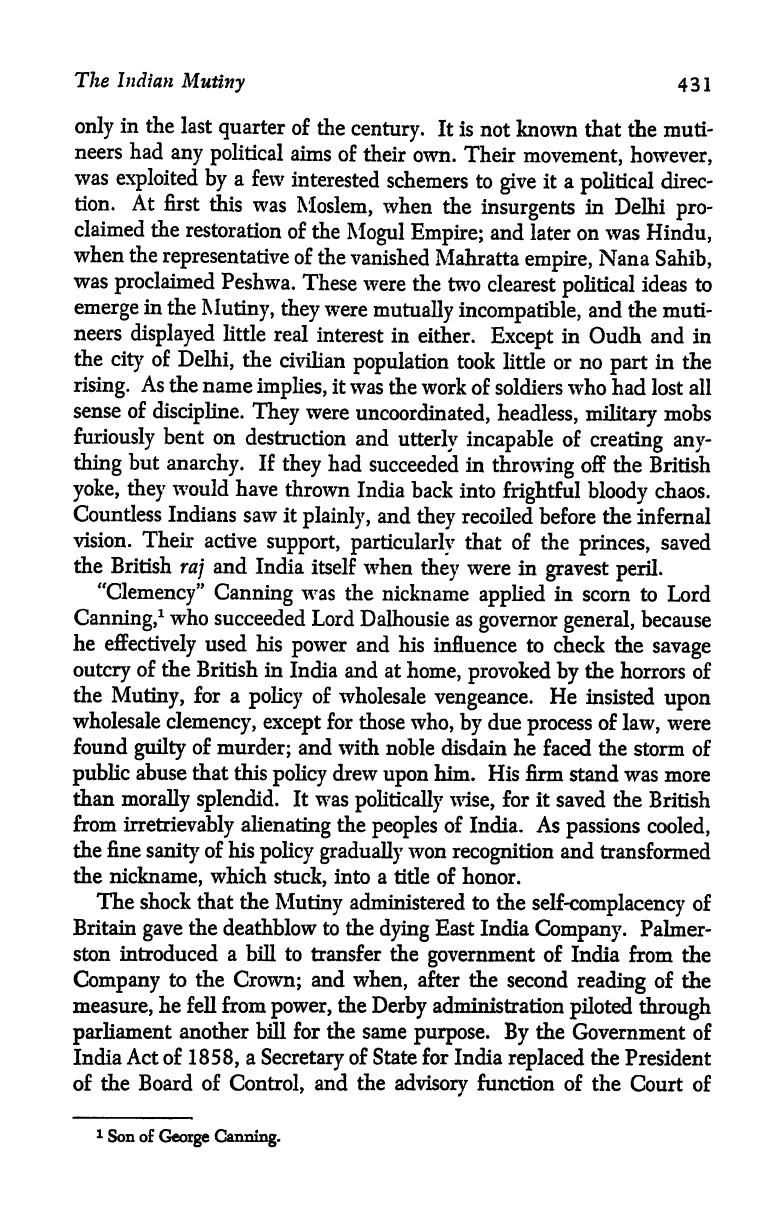
The
Indian
Mutiny
431
only
in
the
last
quarter
of
the
century.
It is
not
known that the muti-
neers
had
any
political
aims
of
their
own. Their
movement,
however,
was
exploited
by
a
few
interested
schemers to
give
it
a
political
direc-
tion.
At
first
this
was
Moslem,
when
the
insurgents
in Delhi
pro-
claimed
the
restoration
of
the
Mogul Empire;
and later on was
Hindu,
when
the
representative
of the
vanished Mahratta
empire,
Nana
Sahib,
was
proclaimed
Peshwa.
These
were
the
two
clearest
political
ideas to
emerge
in
the
Mutiny,
they
were
mutually
incompatible,
and
the
muti-
neers
displayed
little
real
interest in
either.
Except
in Oudh and in
the
city
of
Delhi,
the
civilian
population
took little
or
no
part
in the
rising.
As
the
name
implies,
it
was
the
work of soldiers
who had lost
all
sense
of
discipline.
They
were
uncoordinated,
headless,
military
mobs
furiously
bent
on
destruction
and
utterly
incapable
of
creating
any-
thing
but
anarchy.
If
they
had
succeeded in
throwing
off
the
British
yoke,
they
would have
thrown
India
back
into
frightful
bloody
chaos.
Countless
Indians
saw it
plainly,
and
they
recoiled
before the infernal
vision. Their
active
support,
particularly
that
of the
princes,
saved
the
British
raj
and
India
itself
when
they
were
in
gravest
peril.
"Clemency"
Canning
was the
nickname
applied
in
scorn to
Lord
Canning,
1
who
succeeded
Lord
Dalhousie as
governor general,
because
he
effectively
used
his
power
and
his
influence
to check the
savage
outcry
of
the
British in
India
and
at
home,
provoked by
the
horrors
of
the
Mutiny,
for
a
policy
of
wholesale
vengeance.
He
insisted
upon
wholesale
clemency,
except
for
those
who,
by
due
process
of
law,
were
found
guilty
of
murder;
and with
noble disdain
he
faced the
storm
of
public
abuse that
this
policy
drew
upon
him.
His
firm
stand was
more
than
morally splendid.
It was
politically
wise,
for it
saved
the
British
from
irretrievably
alienating
the
peoples
of India.
As
passions
cooled,
the
fine
sanity
of his
policy
gradually
won
recognition
and
transformed
the
nickname,
which
stuck,
into a
title
of honor.
The shock
that
the
Mutiny
administered
to
the
self-complacency
of
Britain
gave
the deathblow to the
dying
East
India
Company.
Palmer-
ston introduced
a
bill
to
transfer the
government
of India
from the
Company
to
the
Crown;
and
when,
after
the
second
reading
of the
measure,
he fell from
power,
the
Derby
administration
piloted
through
parliament
another bill for
the same
purpose.
By
the
Government
of
India
Act of
1858,
a
Secretary
of State for India
replaced
the
President
of
the Board of
Control,
and
the
advisory
function
of the
Court of
1
Son of
George Canning.
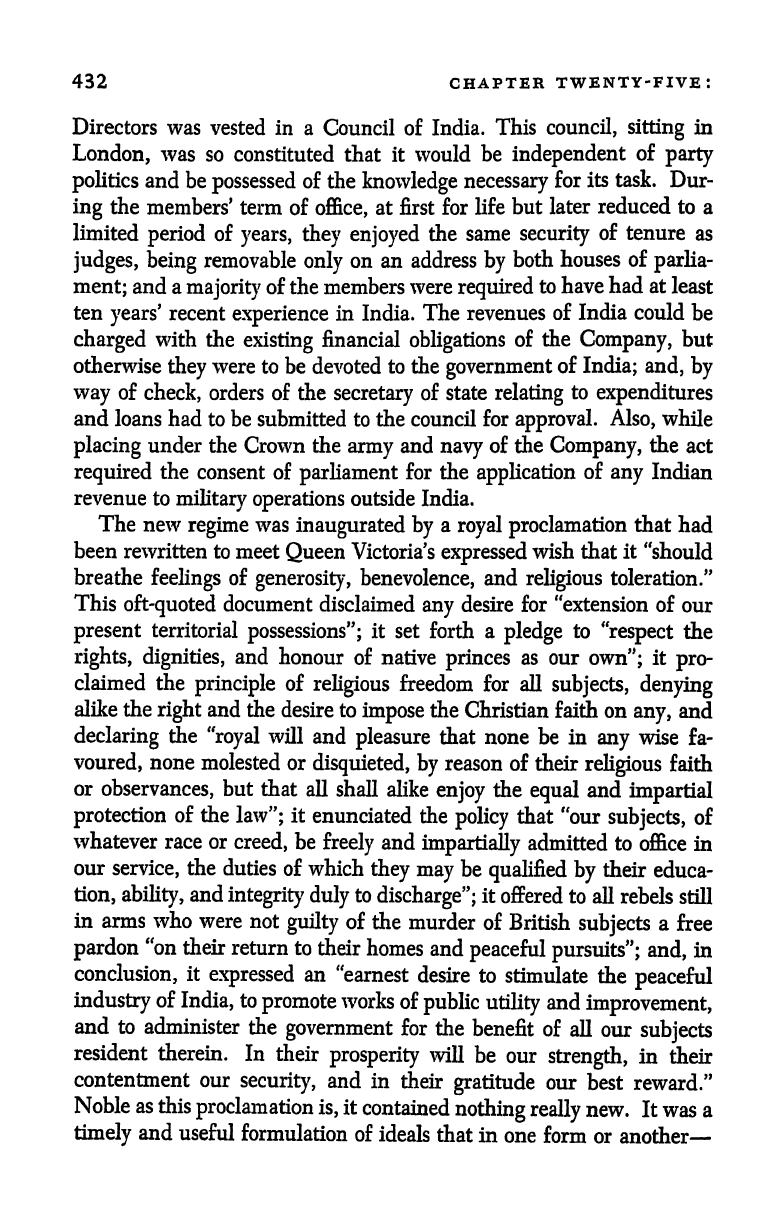
432
CHAPTER
TWENTY-FIVE:
Directors was
vested in a
Council
of India.
This
council,
sitting
in
London,
was so
constituted
that it would
be
independent
of
party
politics
and be
possessed
of
the
knowledge
necessary
for
its
task.
Dur-
ing
the
members' term
of
office,
at first for
life
but
later
reduced
to
a
limited
period
of
years,
they
enjoyed
the
same
security
of tenure
as
judges,
being
removable
only
on an address
by
both
houses
of
parlia-
ment;
and a
majority
of the members were
required
to have
had at
least
ten
years'
recent
experience
in
India.
The revenues
of India could
be
charged
with
the
existing
financial
obligations
of
the
Company,
but
otherwise
they
were to be
devoted
to the
government
of
India;
and,
by
way
of
check,
orders of the
secretary
of
state
relating
to
expenditures
and loans had
to be submitted
to
the
council
for
approval.
Also,
while
placing
under
the
Crown
the
army
and
navy
of the
Company,
the
act
required
the
consent of
parliament
for the
application
of
any
Indian
revenue
to
military
operations
outside
India.
The
new
regime
was
inaugurated
by
a
royal proclamation
that
had
been
rewritten
to meet
Queen
Victoria's
expressed
wish
that
it
"should
breathe
feelings
of
generosity,
benevolence,
and
religious
toleration."
This
oft-quoted
document
disclaimed
any
desire for "extension of
our
present
territorial
possessions";
it
set forth a
pledge
to
"respect
the
rights, dignities,
and
honour
of
native
princes
as
our
own";
it
pro-
claimed
the
principle
of
religious
freedom for all
subjects,
denying
alike the
right
and the
desire
to
impose
the
Christian
faith
on
any,
and
declaring
the
"royal
will
and
pleasure
that none be in
any
wise
fa-
voured,
none
molested or
disquieted,
by
reason
of
their
religious
faith
or
observances,
but
that
all shall
alike
enjoy
the
equal
and
impartial
protection
of the
law";
it
enunciated
the
policy
that
"our
subjects,
of
whatever race or
creed,
be
freely
and
impartially
admitted to
office
in
our
service,
the
duties
of which
they
may
be
qualified
by
their
educa-
tion,
ability,
and
integrity duly
to
discharge";
it
offered
to all
rebels
still
in arms
who were
not
guilty
of
the
murder of
British
subjects
a
free
pardon
"on their
return
to their
homes and
peaceful
pursuits";
and,
in
conclusion,
it
expressed
an
"earnest
desire
to
stimulate
the
peaceful
industry
of
India,
to
promote
works of
public
utility
and
improvement,
and to
administer
the
government
for
the
benefit
of all
our
subjects
resident
therein.
In
their
prosperity
will be
our
strength,
in their
contentment our
security,
and in
their
gratitude
our
best
reward."
Noble as
this
proclamation
is,
it
contained
nothing really
new.
It
was
a
timely
and
useful
formulation
of
ideals
that in
one
form
or
another
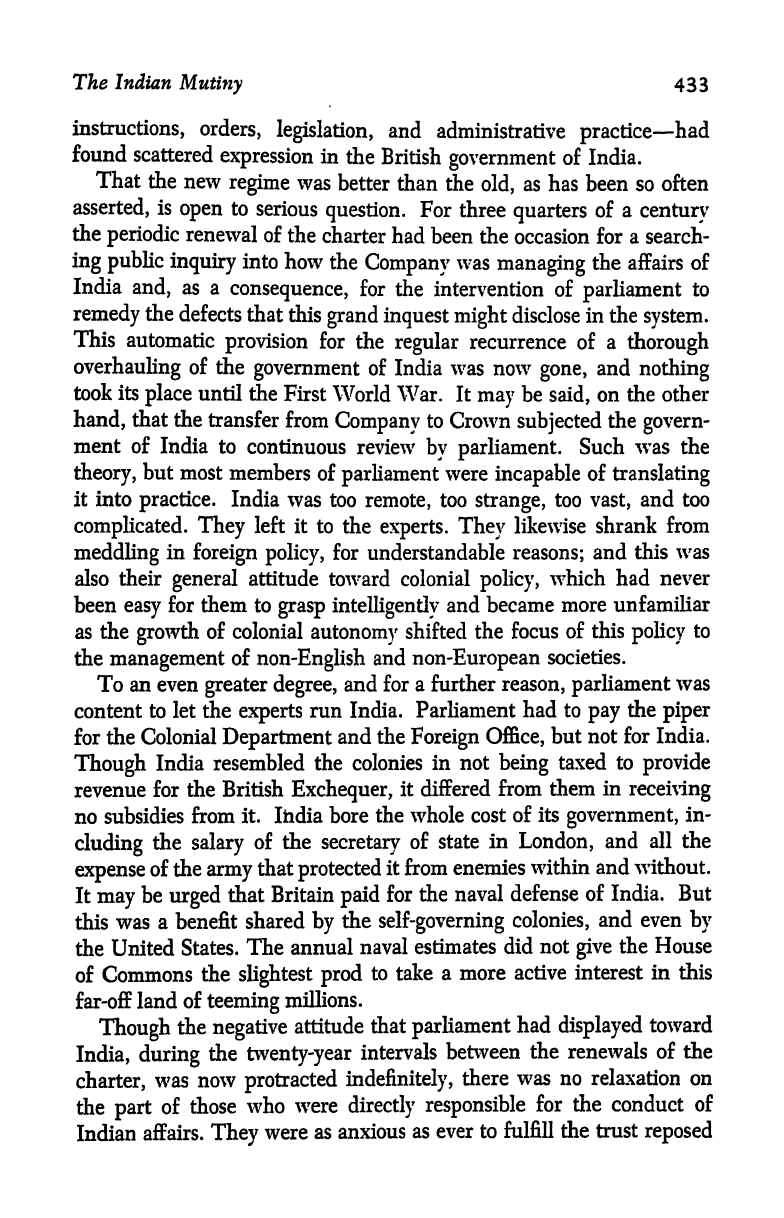
The
Indian
Mutiny
433
instructions,
orders,
legislation,
and
administrative
practice
had
found
scattered
expression
in
the
British
government
of India.
That
the new
regime
was
better
than the
old,
as has been so
often
asserted,
is
open
to
serious
question.
For three
quarters
of
a
century
the
periodic
renewal
of
the
charter had
been the
occasion
for
a
search-
ing
public
inquiry
into
how
the
Company
was
managing
the affairs of
India
and,
as
a
consequence,
for the
intervention of
parliament
to
remedy
the
defects
that
this
grand inquest
might
disclose
in the
system.
This
automatic
provision
for
the
regular
recurrence
of
a
thorough
overhauling
of the
government
of
India was now
gone,
and
nothing
took its
place
until the
First
World
War.
It
may
be
said,
on
the other
hand,
that the
transfer
from
Company
to
Crown
subjected
the
govern-
ment of India
to
continuous review
by parliament.
Such
was the
theory,
but
most
members of
parliament
were
incapable
of
translating
it into
practice.
India
was too
remote,
too
strange,
too
vast,
and
too
complicated. They
left it
to
the
experts. They
likewise shrank
from
meddling
in
foreign policy,
for
understandable
reasons;
and
this
was
also their
general
attitude
toward
colonial
policy,
which had
never
been
easy
for them to
grasp
intelligently
and
became
more unfamiliar
as
the
growth
of colonial
autonomy
shifted the focus
of
this
policy
to
the
management
of
non-English
and
non-European
societies.
To an even
greater degree,
and for
a
further
reason,
parliament
was
content
to
let the
experts
run India.
Parliament had
to
pay
the
piper
for
the Colonial
Department
and the
Foreign
Office,
but
not for India.
Though
India
resembled
the
colonies
in not
being
taxed
to
provide
revenue
for the
British
Exchequer,
it
differed
from
them
in
receiving
no subsidies
from it. India bore
the
whole cost
of
its
government,
in-
cluding
the
salary
of the
secretary
of
state
in
London,
and
all the
expense
of
the
army
that
protected
it
from
enemies
within and without.
It
may
be
urged
that
Britain
paid
for
the
naval
defense of India.
But
this
was a benefit
shared
by
the
self-governing
colonies,
and
even
by
the
United
States.
The annual
naval estimates
did
not
give
the House
of
Commons
the
slightest
prod
to
take
a more
active interest
in
this
far-off
land
of
teeming
millions.
Though
the
negative
attitude
that
parliament
had
displayed
toward
India,
during
the
twenty-year
intervals
between
the renewals of the
charter,
was
now
protracted
indefinitely,
there
was no relaxation on
the
part
of
those
who
were
directly responsible
for
the
conduct
of
Indian
affairs.
They
were
as
anxious
as ever
to
fulfill the trust
reposed
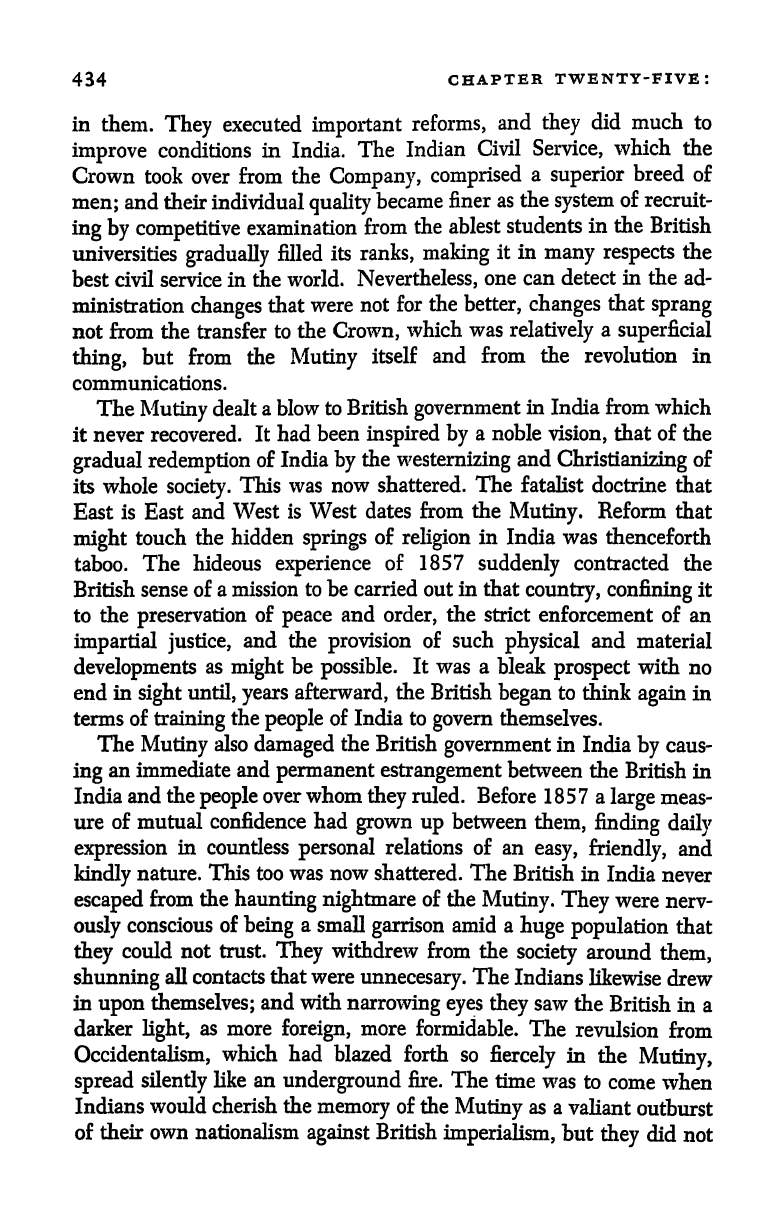
434
CHAPTER
TWENTY-FIVE:
in
them.
They
executed
important
reforms,
and
they
did much
to
improve
conditions
in
India.
The
Indian
Civil
Service,
which
the
Crown
took
over
from
the
Company,
comprised
a
superior
breed
of
men;
and
their individual
quality
became
finer
as
the
system
of recruit-
ing
by
competitive
examination
from
the
ablest
students
in the
British
universities
gradually
filled
its
ranks,
making
it
in
many
respects
the
best civil
service in
the
world.
Nevertheless,
one
can detect
in
the
ad-
ministration
changes
that
were
not
for
the
better,
changes
that
sprang
not from the transfer
to
the
Crown,
which was
relatively
a
superficial
thing,
but
from the
Mutiny
itself
and from
the revolution
in
communications
.
The
Mutiny
dealt
a
blow
to
British
government
in
India
from
which
it never recovered.
It
had
been
inspired
by
a
noble
vision,
that
of
the
gradual
redemption
of India
by
the
westernizing
and
Christianizing
of
its
whole
society.
This
was now
shattered. The fatalist doctrine
that
East
is East
and
West
is
West dates from the
Mutiny.
Reform
that
might
touch
the
hidden
springs
of
religion
in
India
was
thenceforth
taboo.
The
hideous
experience
of
1857
suddenly
contracted
the
British
sense of
a mission
to
be
carried out
in
that
country,
confining
it
to
the
preservation
of
peace
and
order,
the strict
enforcement of
an
impartial
justice,
and
the
provision
of
such
physical
and
material
developments
as
might
be
possible.
It
was
a
bleak
prospect
with
no
end
in
sight
until,
years
afterward,
the British
began
to think
again
in
terms of
training
the
people
of
India to
govern
themselves.
The
Mutiny
also
damaged
the
British
government
in
India
by
caus-
ing
an
immediate
and
permanent
estrangement
between
the
British
in
India
and
the
people
over
whom
they
ruled.
Before
1857
a
large
meas-
ure
of mutual confidence had
grown up
between
them,
finding
daily
expression
in
countless
personal
relations
of an
easy,
friendly,
and
kindly
nature. This too was
now
shattered. The
British in
India
never
escaped
from the
haunting nightmare
of the
Mutiny.
They
were
nerv-
ously
conscious
of
being
a
small
garrison
amid a
huge
population
that
they
could
not trust.
They
withdrew from
the
society
around
them,
shunning
all
contacts
that were
unnecesary.
The
Indians
likewise
drew
in
upon
themselves;
and with
narrowing eyes
they
saw
the
British
in
a
darker
light,
as
more
foreign,
more
formidable.
The
revulsion
from
Occidentalism,
which
had
blazed
forth
so
fiercely
in
the
Mutiny,
spread
silently
like
an
underground
fire.
The
time
was
to
come
when
Indians
would cherish
the
memory
of the
Mutiny
as a
valiant
outburst
of
their own nationalism
against
British
imperialism,
but
they
did
not
